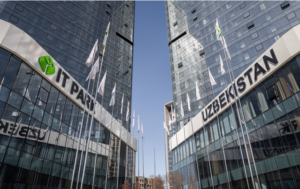
The President of Uzbekistan has signed a decree on measures for the digital transformation of public administration and the real sector of the Uzbek economy.
According to the decree, in 2025-2026, it is planned to launch 41 priority projects in the field of Digital Government and increase the share of electronic public services to 70%. To start providing more than 30 types of public services in mahallas and build 66 thousand kilometers of fiber-optic communication lines, commission 2284 base stations and implement more than 100 information systems. Convert more than 100 types of services for households and businesses into electronic format, including proactive and composite services.
Starting from November 1, 2025, mobile operators, banks and payment organizations will be able to provide paid public services through the Single Portal of Interactive Public Services.
Starting December 2025, non-governmental non-profit organizations will also be allowed to engage in interagency electronic interaction.
Starting January 1, 2026, social assistance processes, family and resident data management, and work in mahallas will be transferred to the Digital Mahalla platform.
By the end of 2026, the Cadastre Agency will complete the transfer of all real estate data to the UZKAD system and create a Unified Address Register linked to WGS-84.
By December 1, 2026, the Ministry of Digital Technologies will develop a single digital platform, OASIS, which will provide
The operator will be the Digital Government Project Management Center, funded by the Ministry of Digital Transformation and other sources not prohibited by law.
Starting November 1, startups under the Central Bank’s Digital Startups and Regulatory Sandbox programs will be able to use the Digital Data Platform for free for up to one year.
Foreign specialists who are residents of IT parks will be able to remotely open accounts and virtual cards in Uzbekistan by obtaining a PIN through diplomatic missions.
From January 1, 2026, residents of IT parks will be allowed to

– The first corporation to top the Corporate Knights Global 100 twice
– 14th consecutive year in the Global 100, 7th time in the top ten
– Strong results in key ESG rankings for 2024
Rueil-Malmaison (France), January 22, 2025 – Schneider Electric, a leader in digital transformation in energy management and automation, has been named the World’s Most Sustainable Corporation 2025 by Corporate Knights and is the only company to be ranked first twice in the Global 100. For the first time, Schneider Electric topped this annual list of the most sustainable public companies with annual revenues over $1 billion in 2021. This unique achievement underscores the company’s long-term commitment to sustainability and its integrated approach to achieving the best environmental, social and governance (ESG) results.
“For many years, sustainability has been at the heart of Schneider Electric’s business. For IMPACT, it is not just a corporate goal, but a driving force that drives our business decisions and inspires our employees,” said Olivier Blum, CEO of Schneider Electric. “Being named the second Most Sustainable Corporation in the World by Corporate Knights, along with other key ESG recognitions, is a testament to the meaningful, long-term positive impact we are making.”
This year’s top spot for Schneider Electric reflects its leadership in sustainability, including its gender balance among executives and board members, as well as its innovative solutions for energy efficiency, electrification and decarbonization. Schneider also received high marks for its efforts to decouple energy consumption and carbon emissions from business growth, as well as for its significant investment in sustainable research and development. Corporate Knights also noted the correlation between the executive compensation system and the company’s sustainability goals and ESG ratings.
The annual Global 100 index, compiled by Canadian media and research company Corporate Knights, is based on openly available quantitative data on resource use, employee and supplier policies, sustainable revenues and investments. The Global 100 methodology uses both fixed and variable key performance indicators to compare companies among their competitors. Schneider Electric has been included in the Global 100 for the 14th consecutive year and the 7th time in the top 10, a record for its electrical equipment industry.
The awarding of this title in 2021 and 2025 coincides with the beginning and end of the five-year period of the latest Schneider Sustainability Impact program. This program measures the company’s progress against a number of key ESG goals set for the end of 2025 and helps maintain a sustained focus on achieving both global and local ambitions.
Schneider ‘s leadership in sustainability is also recognized by recent high scores from leading ESG rating providers:

See also:
– Schneider Electric latest sustainability performance reports
– Environment, Social, Governance (ESG) FAQ
About Schneider Electric
Schneider’s purpose is to create impact by empowering everyone to make the most of our energy and resources, ensuring progress and sustainability for all. We call it Life Is On.
Our mission is to be a trusted partner in sustainability and efficiency.
We are a global technology leader, bringing world-class expertise in electrification, automation and digitalization to smart industries, reliable infrastructure, future-proof data centers, smart buildings and intuitive homes. Drawing on our deep industry expertise, we provide integrated end-to-end AI-enabled industrial IoT solutions with connected products, automation, software and services, creating digital twins to drive profitable growth for our customers.
Ourmain resource is our 150,000 employees and more than a million partners operating in more than 100 countries to ensure proximity to our customers and stakeholders. We support diversity and inclusion in everything we do, guided by our meaningful purpose of a sustainable future for all.

A memorandum of partnership in the field of digital transformation was signed between Ukraine and Switzerland, according to the Telegram channel of the President of Ukraine.
“A memorandum of partnership in the field of digital transformation was signed between Ukraine and Switzerland. We plan to deepen our cooperation to help restore Ukraine through digitalization,” the report says.
The parties also discussed the possibilities of Swiss assistance in supporting digitalization and restoration of telecommunications systems in the recently occupied territories of Ukraine.

The Ministry of Digital Transformation of Ukraine has received an application from Samsung for residency in Diia.City, Deputy Prime Minister, Minister of Digital Transformation Mykhailo Fedorov said on his Telegram channel on Tuesday.
In addition, according to Fedorov, the Ukrainian IT company MacPaw also applied for residency in Diia.City.
Samsung Electronics is a company that introduces technologies in the world of smartphones, TVs, and home devices. It is a leader in the introduction and commercialization of innovative technologies in the markets of South Korea, the United States and Japan. In Ukraine, the official office was opened in December last year.
MacPaw is a Ukrainian IT company that has been developing software for Apple systems since 2008. It creates applications that make it easy to work on Mac. The most famous products are the CleanMyMac MacBook cleaner, the Gemini photo deletion program, and the alternative appstore Setapp.
Diia.City is a special legal and tax regime for IT, which involves a set of measures to stimulate the development of the high-tech industry.

Mobile network operators Kyivstar and Vodafone Ukraine are in dialogue with the Ministry of Digital Transformation on the issue of smartphoneization of the elderly.
“Preliminary consultations with the Ministry of Digital Transformation on this project were held. But the implementation and details of the project have not yet been finalized,” the Kyivstar press service told Interfax-Ukraine.
The company recalled that the operator is systematically working to overcome digital barriers between generations: in 2019, the educational project Smartphone for Parents was launched; at the beginning of 2020 a special line of tariffs for subscribers over 60 years old were introduced.
“Digital services, for which we, among other things, are building coverage, cannot be obtained on feature phones. Therefore, smartphoneization is a strategic task at the national level. We are already in dialogue with government authorities on this issue. At the moment, we are waiting for project proposals, which we can study,” the press service of Vodafone Ukraine told Interfax-Ukraine.
The company said that not all Ukrainians still use smartphones: according to the operator, about 28% still use feature phones. In most cases, these are older subscribers.
“The authorities have indeed turned to us with a request for a preferential tariff for pensioners. lifecell is ready to join the working group on this project. Details on the development of the tariff will be discussed at joint meetings with the Ministry of Digital Transformation,” lifecell’s press service told Interfax-Ukraine.
The operator also said that among its already existing offers, one can choose convenient tariffs for each subscriber.

The EU intends to provide Ukraine with EUR 20 million of financial support for the digital transformation development, Deputy Prime Minister, Minister of Digital Transformation Mykhailo Fedorov said.
“EUR 9.6 million is the first financial contribution that Ukraine will receive under the EU4DigitalUA project. The Estonia’s e-Governance Academy and the Spanish foundation FIIAPP Spain will help in the implementation of projects on electronic services, cybersecurity, data protection, and the development of registries,” Fedorov wrote on the Facebook.
He wrote that funding will also cover: development of infrastructure for electronic government; modernization of public e-services and development of services on the Diia (Action) portal and in the Dia app; visualization of information about access to broadband Internet in Ukraine; further connection of the main registers to the Trembita data exchange system; development of a national personal identifier, a state digital identity card and a register registration addresses of citizens; development of trust services.
“Support of digitalization in Ukraine is at the same time support of all key reforms and anti-corruption. The country will receive more qualitative changes. We are grateful to the EU for their trust and we act together,” Fedorov wrote.